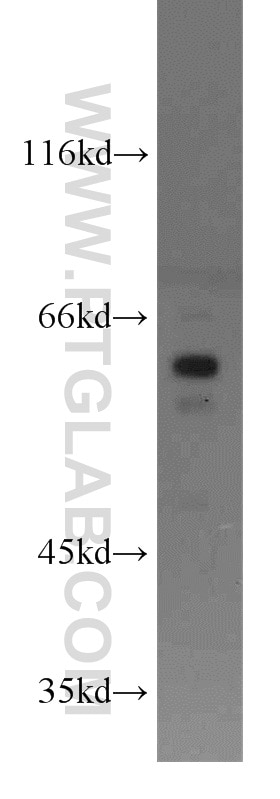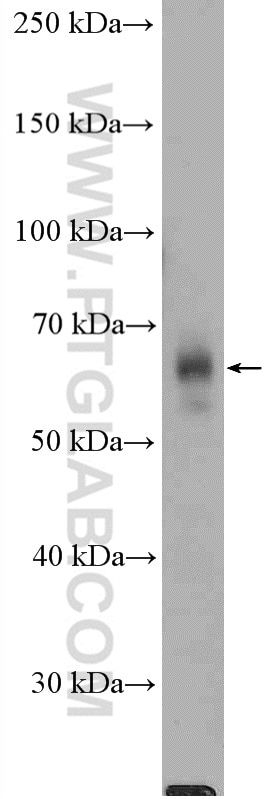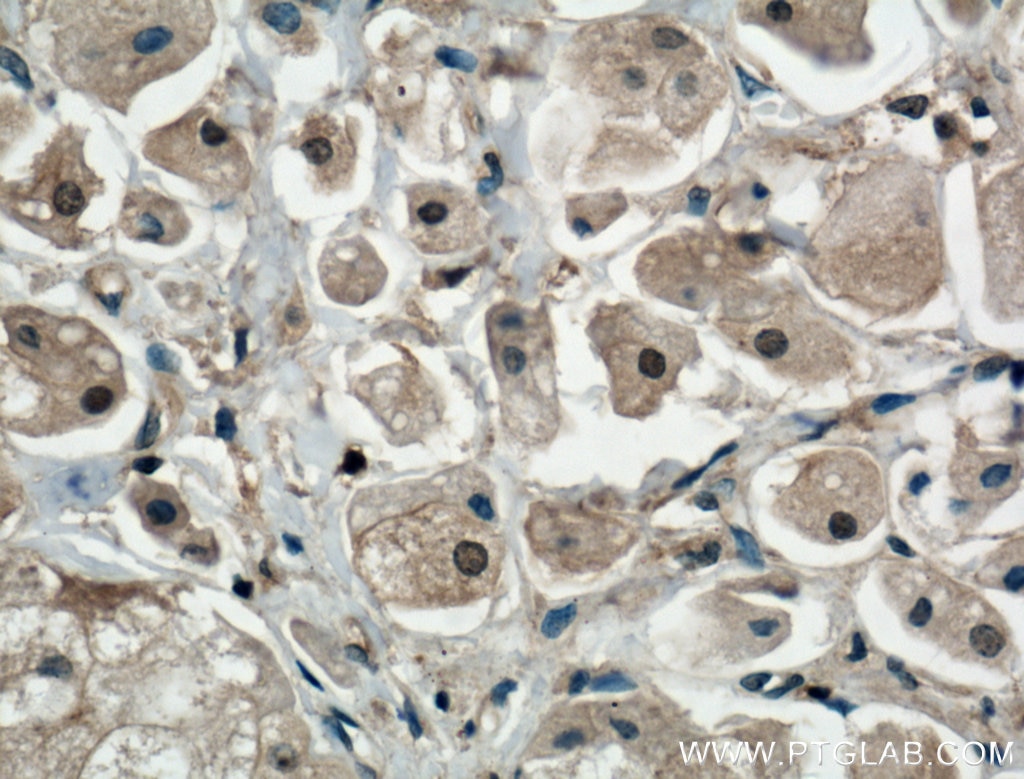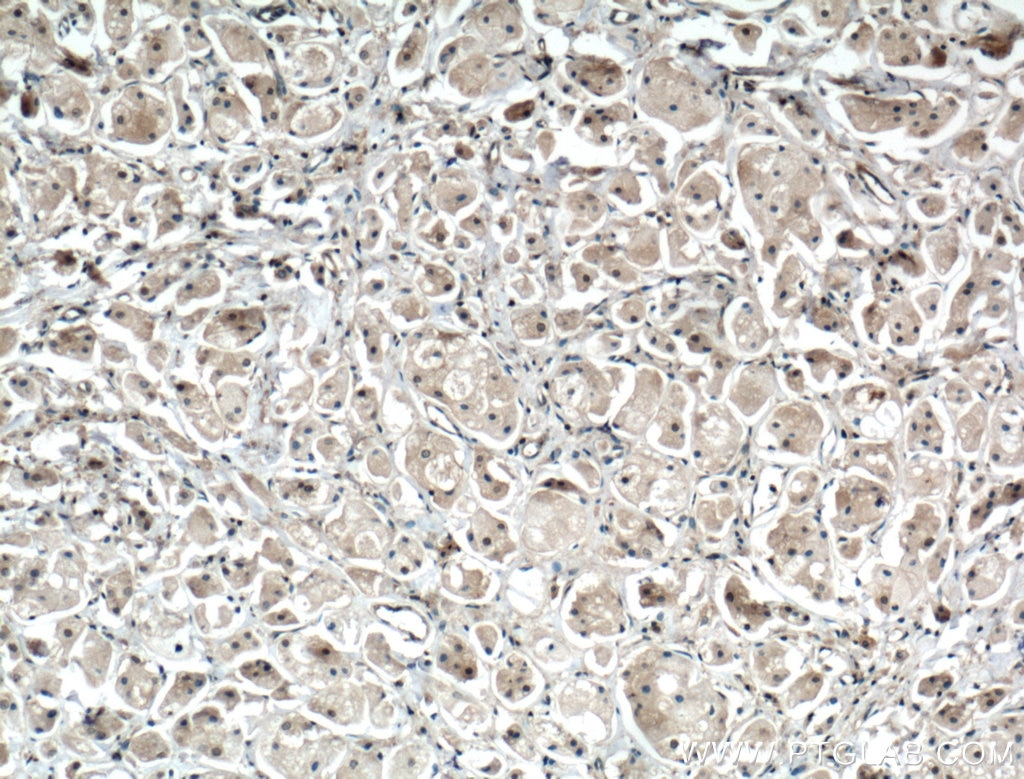Validation Data Gallery
Tested Applications
| Positive WB detected in | MCF-7 cells, LNCaP cells |
| Positive IHC detected in | human breast cancer tissue Note: suggested antigen retrieval with TE buffer pH 9.0; (*) Alternatively, antigen retrieval may be performed with citrate buffer pH 6.0 |
Recommended dilution
| Application | Dilution |
|---|---|
| Western Blot (WB) | WB : 1:500-1:2000 |
| Immunohistochemistry (IHC) | IHC : 1:50-1:500 |
| It is recommended that this reagent should be titrated in each testing system to obtain optimal results. | |
| Sample-dependent, Check data in validation data gallery. | |
Published Applications
| KD/KO | See 3 publications below |
| WB | See 12 publications below |
| IHC | See 1 publications below |
| IF | See 1 publications below |
Product Information
17086-1-AP targets PDPK1 in WB, IHC, IF, ELISA applications and shows reactivity with human samples.
| Tested Reactivity | human |
| Cited Reactivity | human, mouse |
| Host / Isotype | Rabbit / IgG |
| Class | Polyclonal |
| Type | Antibody |
| Immunogen | PDPK1 fusion protein Ag9213 相同性解析による交差性が予測される生物種 |
| Full Name | 3-phosphoinositide dependent protein kinase-1 |
| Calculated molecular weight | 556 aa, 63 kDa |
| Observed molecular weight | 60-63 kDa |
| GenBank accession number | BC012103 |
| Gene Symbol | PDPK1 |
| Gene ID (NCBI) | 5170 |
| RRID | AB_2161289 |
| Conjugate | Unconjugated |
| Form | Liquid |
| Purification Method | Antigen affinity purification |
| UNIPROT ID | O15530 |
| Storage Buffer | PBS with 0.02% sodium azide and 50% glycerol |
| Storage Conditions | Store at -20°C. Stable for one year after shipment. Aliquoting is unnecessary for -20oC storage. |
Background Information
3-Phosphoinositide dependent protein kinase-1 (PDK1 or PDPK1) is a serine-threonine kinase belonging to AGC kinase family. PDK1 plays a critical role in establishing ACD (Asymmetric cell division) in the epithelium (PMID: 27184845). The kinase activity of PDK1 depends on phosphatidyl inositol 3-kinase (PI3K), a key intermediate in signaling pathways including those from growth factor receptors and adhesion molecules. Substrates of PDK1, including AKT and the protein kinase C (PKC) isozymes, regulate a number of essential cell functions (PMID: 20027184). PDPK1 has 5 isoforms produced by alternative splicing of 48~63 kDa and is detected as 60-63 kDa.
Protocols
| Product Specific Protocols | |
|---|---|
| WB protocol for PDPK1 antibody 17086-1-AP | Download protocol |
| IHC protocol for PDPK1 antibody 17086-1-AP | Download protocol |
| Standard Protocols | |
|---|---|
| Click here to view our Standard Protocols |
Publications
| Species | Application | Title |
|---|---|---|
Mol Cell A Non-canonical PDK1-RSK Signal Diminishes Pro-caspase-8-Mediated Necroptosis Blockade.
| ||
Cell Mol Life Sci Phosphocholine inhibits proliferation and reduces stemness of endometrial cancer cells by downregulating mTOR-c-Myc signaling | ||
PLoS Biol Loss of hepatic aldolase B activates Akt and promotes hepatocellular carcinogenesis by destabilizing the Aldob/Akt/PP2A protein complex. | ||
Free Radic Biol Med Redox sensor NPGPx restrains ZAP70 activity and modulates T cell homeostasis. | ||
Front Immunol Identification of senescence-related subtypes, establishment of a prognosis model, and characterization of a tumor microenvironment infiltration in breast cancer
| ||
J Innate Immun Mannan-Binding Lectin Reduces Epithelial-Mesenchymal Transition in Pulmonary Fibrosis via Inactivating the Store-Operated Calcium Entry Machinery. |



